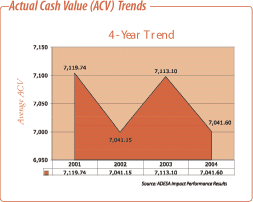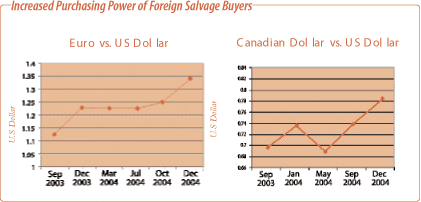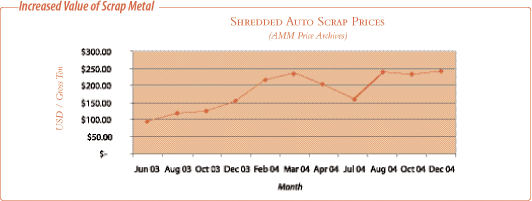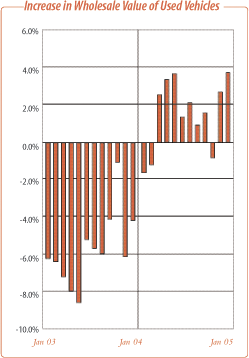
| Activities on the Legal Front | |
| What's Driving Your Salvage Returns? | |
| CCC Newswire | |
 |
| What's Driving Your Salvage Returns? |
 By Tom Kontos By Tom Kontos 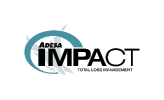 |
| Over the past 18 months, vehicle salvage re-marketers have seen substantial improvements to recoveries from the previous five years. Drivers effecting vehicle salvage values can be attributed to two broad categories. The first is direct economic influences that have an impact on the value of every salvage vehicle being re-marketed. These include: title branding (what you can do with the salvage vehicle); the demand for recycled vehicle parts; insurance claims practices governing when to total loss a vehicle; geographic supply and demand, and; underwriting practices of insurers (standard v. non-standard lines). However, there are also strong outside economic influences beyond the control of claims departments and salvage auctions, which also determine a significant portion of recoveries. What follows is data illustrating some of those influences. Any time your denominator decreases, the percentage will increase—even if your numerator stays the same (gross sales price divided by the ACV). Over the course of the last few years, there has been a trend towards lower average cash values (ACVs), which has helped increase the gross recovery percentage (below).
Another factor that has been a cause for improvement is the international salvage buyer. Improved purchasing power, as we’ve seen in recent months, has enabled foreign buyers to be more competitive and export more vehicles (below).
Another positive economic influence was the staggering 18-month-long recovery in scrap steel (below). Foreign scrap steel buyers, most notably led by China, have driven the price of scrap steel up dramatically over the all-time lows that were reached a couple of years ago.
The increase in wholesale vehicle prices (below) make it more cost effective to “re-build” salvage vehicles, while simultaneously improving demand for recycled parts from people opting to “repair” instead of “replace” due to cost.
Conclusion Tom Kontos is Vice President of Industry Relations & Analytical Services with ADESA, Inc. ADESA Impact, formerly Auto Placement Center Inc. [APC], is a subsidiary of ADESA Corporation headquartered in Indianapolis, Indiana, a unique and diversified multi-services company. ADESA operates 55 wholesale vehicle auctions and six commercial truck sales in the U.S. and Canada. ADESA Impact is also headquartered in Indianapolis, Indiana and operates 16 total loss vehicle auctions in the U.S. In addition to its auction and transportation business, ADESA Impact provides total loss vehicle claim services such as appraisals, inspections, evaluations, titling and settlement administration to its clients. |
